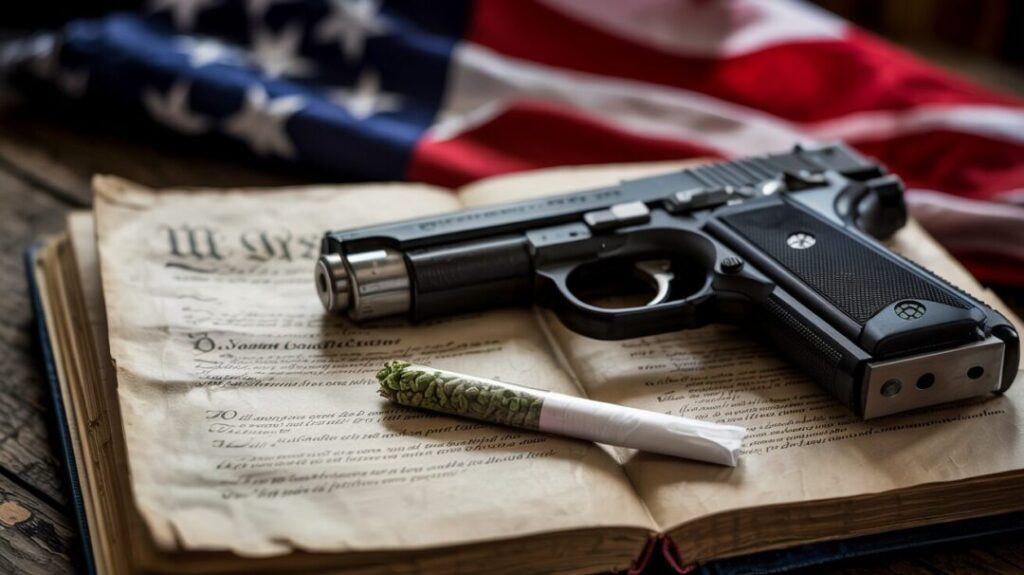The U.S. Supreme Court just agreed to take up a major gun rights case – one that could reshape how federal law treats Americans who legally use marijuana.
The case, United States v. Hemani, began in Texas, but could have big ripple effects for states like Nevada where recreational cannabis has been legal since 2017.
Here’s what happened.
A Gun, Some Pot, and a 50-Year-Old Law
Back in 2023, federal agents searched the home of Ali Danial Hemani, a dual U.S.-Pakistani citizen, after investigating possible ties to Iran’s Revolutionary Guard.
They found no link to terrorism. What they did find was a legally owned 9mm Glock pistol, about two ounces of marijuana, and a small amount of cocaine that Hemani admitted was his.
Even though Hemani wasn’t accused of being high or violent, the government charged him under a 1968 law that makes it a crime for any “unlawful user” of drugs to own a gun.
That same rule has blocked thousands of gun sales over the years, second only to felony convictions.
But times have changed. More than half the country now allows legal marijuana in some form.
Yet the federal government still classifies it as a “Schedule I” drug, right up there with heroin.
That means even a law-abiding gun owner in Nevada who enjoys a joint at home could technically face a federal felony.
A Conservative Court Pushback
A federal judge first threw out the charge, citing the Supreme Court’s 2022 Bruen decision, which said gun laws must fit the nation’s “history and tradition” – not just modern ideas of public safety.
This year, the conservative-leaning Fifth Circuit Court of Appeals agreed.
The judges ruled the law goes too far because early American laws only banned carrying weapons while drunk or high, not owning them while sober.
In other words, there’s no historical tradition of banning “habitual users” from keeping firearms.
The Trump administration’s Justice Department, which has generally supported Second Amendment rights, appealed anyway.
Officials argued that “habitual illegal drug users” can pose a risk when armed, pointing to laws from the 1920s and 1930s that disarmed addicts.
On October 20, the Supreme Court said it will hear the case next year.
What’s at Stake
For everyday Nevadans, the case could decide whether federal law can keep treating marijuana users as second-class citizens.
Nevada voters approved recreational cannabis eight years ago. The industry now supports thousands of jobs and brings in over $150 million a year in taxes.
Yet under federal law, those same users can’t buy or own a gun – and the state’s background-check system must flag them if they try.
That’s a problem in a state that also strongly supports the Second Amendment.
Roughly 40 percent of Nevada adults own a firearm, one of the higher rates in the West.
Gun-rights groups like the Firearms Policy Coalition are cheering the Supreme Court’s review, calling it a chance to “restore freedom to responsible adults.”
They argue that if the government doesn’t ban alcohol drinkers from owning guns — even though alcohol contributes to far more violence — it shouldn’t ban marijuana users either.
Public-safety groups disagree. They say the rule helps keep guns out of the hands of impaired people, and that marijuana can affect judgment just like alcohol.
The Political Undercurrent
The same law used against Hemani was used to convict Hunter Biden in 2024 for owning a gun while using crack cocaine – before President Biden later pardoned him.
That case drew accusations of double standards, especially since millions of ordinary Americans could face the same charge with no pardon waiting.
If the Supreme Court sides with Hemani, it could force Congress or the Justice Department to update outdated drug laws that don’t match today’s reality.
If it sides with the government, cannabis users in legal states like Nevada would remain trapped in the gray area – free to smoke or own a gun, but not both.
Either way, the decision – expected by June 2026 – will likely define how far the Constitution protects gun owners in an era when half the country has said yes to marijuana but Washington still says no.
The opinions expressed by contributors are their own and do not necessarily represent the views of Nevada News & Views. This article was written with the assistance of AI. Please verify information and consult additional sources as needed.




